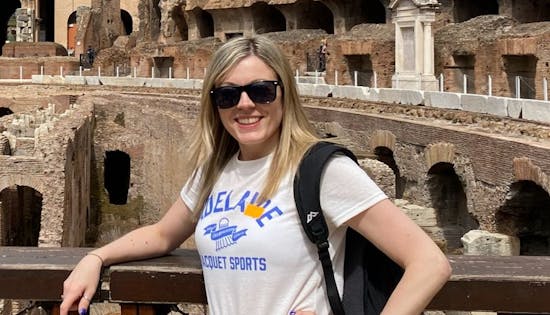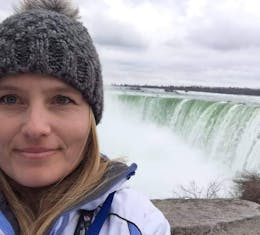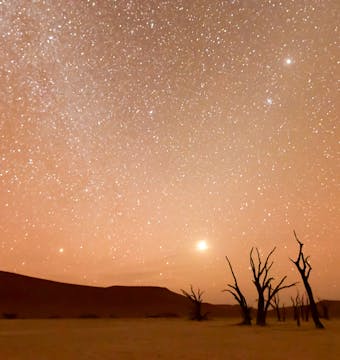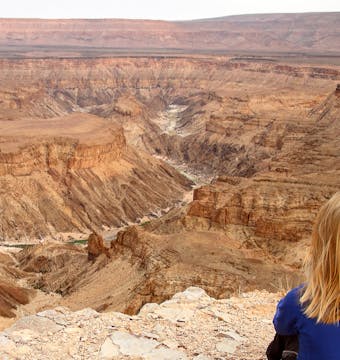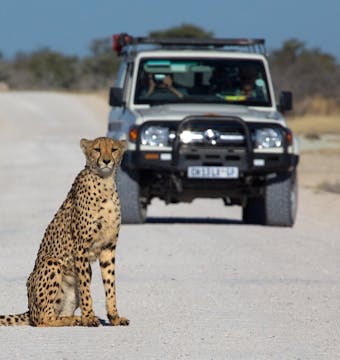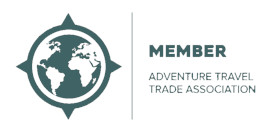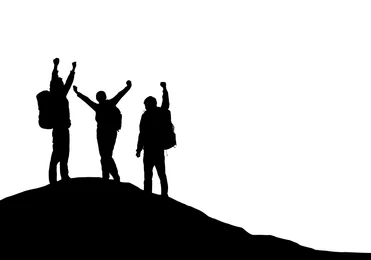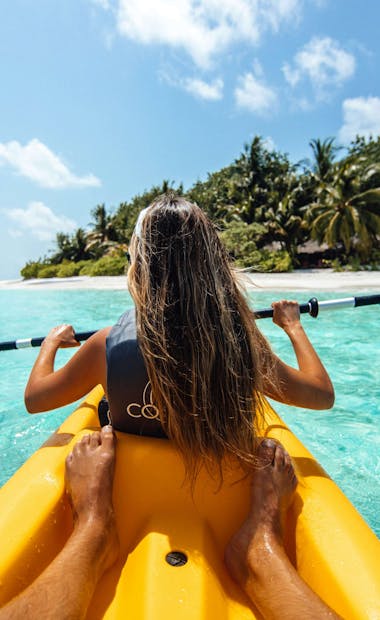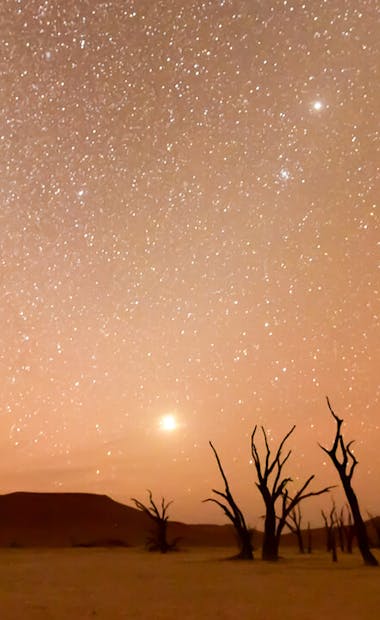
Namibia Tours
Explore the skeleton coast and wilderness of the desert on a small group tour
Popular tours
- Save26%
 View Tour
View TourJourneys: Wonders of Namibia - 10 Days
- Windhoek to Windhoek
- Age group: 12 - 100
- Max group size: 14
Was:£3,799From£2,821 - Save9%
 View Tour
View TourNamibia Lodge Safari - 12 Days
- Windhoek to Windhoek
- Age group: 16 - 79
- Max group size: 16
Was:£3,620From£3,287 - Save1%
 View Tour
View TourPremium Namibia - 10 Days
- Windhoek to Windhoek
- Age group: 15 - 99
- Max group size: 12
Was:£4,310From£4,267  View Tour
View TourNamibia Sand Dunes & Safari - 8 Days
- Windhoek to Windhoek
- Age group: 12 - 99
- Max group size: 12
From£2,284- Save36%
 View Tour
View TourNamibia Discovery - 14 Days
- Cape Town to Windhoek
- Age group: 15 - 99
- Max group size: 13
Was:£3,395From£2,185 - Save26%
 View Tour
View TourBotswana & Victoria Falls Adventure - 8 Days
- Windhoek to Victoria Falls
- Age group: 12 - 100
- Max group size: 18
Was:£1,949From£1,447
Namibia Tours
Welcome to the enchanting land of Namibia, where breathtaking landscapes, captivating wildlife, and rich cultural heritage converge to create an unforgettable travel experience. Embark on a remarkable journey through this African gem with our curated Namibia tours and holidays. Immerse yourself in the awe-inspiring beauty of this diverse country, where endless deserts meet dramatic coastlines, and ancient cultures blend with modern discoveries.
Namibia is a land of contrasts, offering an array of remarkable attractions that will leave you spellbound. Let us take you on a virtual tour of the highlights that await you in this captivating destination.
One of Namibia's crown jewels is the mesmerizing Namib Desert, one of the oldest and driest deserts on the planet. Prepare to be amazed as you witness the ever-changing hues of the towering sand dunes in Sossusvlei. Marvel at the ethereal beauty of Deadvlei, where ancient camel thorn trees stand silhouetted against the stark white clay pan, creating a surreal landscape that will leave you in awe.
Venture further into the heart of Namibia, and you'll discover the iconic Etosha National Park, a haven for wildlife enthusiasts. Embark on thrilling game drives, where you'll encounter majestic elephants, graceful giraffes, agile cheetahs, and the endangered black rhino. Witness the remarkable spectacle of wildlife congregating around the shimmering salt pans, creating unforgettable safari moments.
Namibia's Skeleton Coast is a hauntingly beautiful stretch of coastline that captures the imagination. Explore the rugged shores, where towering sand dunes meet the crashing waves of the Atlantic Ocean. Discover the shipwrecks that have become a testament to the unforgiving nature of this coastal wilderness.
For a glimpse into Namibia's rich cultural tapestry, visit the fascinating Himba and San communities. Immerse yourself in their ancient traditions, learn about their way of life, and gain a deeper understanding of Namibia's diverse heritage.
Namibia also offers thrilling adventure opportunities for the intrepid traveler. Trek through the dramatic landscapes of the Fish River Canyon, the second-largest canyon in the world, or embark on an adrenaline-pumping quad biking excursion through the vast expanses of the Namib Desert. For stargazing enthusiasts, the clear night skies of Namibia present a celestial spectacle that will leave you mesmerized.
In Namibia, nature's raw beauty unfolds at every turn, leaving an indelible mark on your soul. Whether it's the boundless horizons of the desert, the wildlife encounters in pristine national parks, or the cultural encounters with indigenous communities, Namibia promises a transformative journey that will ignite your sense of adventure and leave you yearning for more.
Choose our Namibia tours and holidays to unlock the secrets of this captivating destination. Let us curate a personalized itinerary that showcases the best of Namibia, ensuring an immersive and unforgettable travel experience. Embark on an extraordinary adventure that will redefine your perception of the world and create cherished memories that will last a lifetime. Namibia awaits, ready to captivate your heart and soul.
When is the best time to visit Namibia?
The best time to visit Namibia largely depends on your preferences and the specific experiences you seek. Namibia experiences a predominantly dry climate with abundant sunshine throughout the year, but the country's diverse landscapes and varying temperatures offer distinct seasonal advantages. Here are the key factors to consider when planning your visit:
Dry Season (May to October): This period is generally considered the best time to visit Namibia. The weather is dry, and temperatures are pleasant, with cooler mornings and evenings. Wildlife viewing in parks such as Etosha National Park is excellent during this time, as animals gather around waterholes. The clear skies also provide optimal conditions for stargazing. It's worth noting that this period corresponds to Namibia's winter months, so pack warm layers for early morning game drives and colder nights.
Wet Season (November to April): This period brings the summer rains, which transform the landscapes, rejuvenating the desert and creating lush vegetation. It's an excellent time for birdwatching, as migratory species arrive in Namibia. The landscape bursts with vibrant colors, and some areas, like the Caprivi Strip and the Zambezi Region, become greener and more accessible. However, road conditions can be challenging, and certain areas may be impassable due to flooding. Be prepared for hot and humid weather, especially in the coastal regions.
Shoulder Seasons: The transitional periods between the dry and wet seasons (April and November) can offer a balance of favorable weather conditions, fewer crowds, and potentially more affordable prices. These months are worth considering if you prefer milder temperatures and a mix of greenery and drier landscapes.
Ultimately, the best time to visit Namibia depends on your interests and priorities. Whether you seek optimal wildlife viewing, breathtaking landscapes, or a unique combination of natural phenomena, Namibia's diverse climate and ever-changing scenery offer something special throughout the year. Consult with your travel agent or tour operator to determine the best timing based on your specific itinerary and preferences.
Will I need a visa to travel to Namibia?
Whether you need a visa to travel to Namibia depends on your nationality. Here are some general guidelines:
Visa-Free Travel: Citizens of certain countries do not require a visa to enter Namibia for tourism purposes, usually for a specific duration of stay. These countries may include the United States, Canada, the United Kingdom, most European Union countries, Australia, New Zealand, and several African countries. The allowed stay may vary, typically ranging from 30 to 90 days. It's important to check the specific requirements and duration for your country of citizenship.
Visa on Arrival: Some nationalities can obtain a visa upon arrival at the airport or border post in Namibia. This option is available for tourism purposes and often grants a stay of up to 90 days. However, it's essential to verify if this option is available for your nationality and to ensure you have the required documents and fees for the visa.
Visa Application: If you are from a country that requires a visa to enter Namibia or if you prefer to have your visa secured in advance, you will need to apply for a visa at the nearest Namibian embassy or consulate in your country of residence. The visa application process typically involves providing the necessary documents, such as a completed application form, a valid passport with sufficient validity, proof of accommodation in Namibia, proof of sufficient funds for your stay, and a return or onward ticket.
To ensure accurate and up-to-date information regarding visa requirements for your specific nationality, it is highly recommended to check with the Namibian embassy or consulate in your country or consult with a reputable travel agent or tour operator who can provide guidance and assistance with the visa application process.
Remember to check the validity of your passport as well, as most countries require it to be valid for at least six months beyond your intended departure date. Planning ahead and ensuring you have the necessary travel documents will help ensure a smooth and hassle-free entry into Namibia.
What are the must see destinations in Namibia?
Namibia is a country of extraordinary natural beauty, diverse landscapes, and unique cultural experiences. Here are some must-see destinations that will leave you awe-inspired:
Sossusvlei and Namib-Naukluft National Park: Witness the iconic red sand dunes of the Namib Desert, including the renowned Big Daddy and Dune 45. Explore the surreal landscapes of Sossusvlei and Deadvlei, where ancient camel thorn trees stand juxtaposed against stark white clay pans.
Etosha National Park: Embark on a thrilling safari adventure in one of Africa's premier wildlife destinations. Etosha's vast salt pan and waterholes attract a wide variety of wildlife, including elephants, lions, giraffes, zebras, and endangered black rhinos. The game drives offer incredible opportunities for wildlife viewing and photography.
Fish River Canyon: Marvel at the grandeur of Africa's largest canyon and one of the world's most impressive natural wonders. Trek along the Fish River Hiking Trail, which provides an adventurous multi-day journey through the dramatic landscapes, winding riverbeds, and towering cliffs.
Skeleton Coast: Explore the hauntingly beautiful coastline characterized by towering dunes, shipwrecks, and misty mornings. Witness the meeting point of the Namib Desert and the Atlantic Ocean, where desert-adapted wildlife such as seals and jackals roam.
Damaraland: Discover the rugged and remote landscapes of Damaraland, home to the ancient rock formations of Twyfelfontein, a UNESCO World Heritage Site showcasing remarkable rock engravings. Encounter desert-adapted elephants and explore the impressive geological features of the region, including the Brandberg Mountain and the Organ Pipes.
Swakopmund: Immerse yourself in the charming coastal town of Swakopmund, known for its German colonial architecture and adventure activities. Enjoy adrenaline-pumping experiences such as quad biking, sandboarding, and skydiving, or simply relax and savor fresh seafood by the Atlantic Ocean.
Himba Villages: Experience the rich cultural heritage of the Himba people, one of Namibia's indigenous communities. Visit traditional villages to learn about their customs, traditions, and way of life, gaining a deeper appreciation for Namibia's diverse cultures.
Caprivi Strip: Explore the lush landscapes of the Caprivi Strip (now called the Zambezi Region), a narrow strip of land extending eastward from Namibia. Discover the Bwabwata and Mudumu National Parks, known for their wildlife and riverine ecosystems, and enjoy activities such as boat safaris, birdwatching, and fishing.
These are just a few highlights of Namibia's many remarkable destinations. The country offers endless opportunities for adventure, wildlife encounters, and cultural exploration. Whether you're captivated by the vast desert landscapes, the vibrant wildlife, or the rich heritage of its people, Namibia promises a truly unforgettable journey.
What is the local currency in Namibia, and can I use credit cards?
The local currency in Namibia is the Namibian Dollar (NAD). It is the official currency of Namibia, and it is widely accepted throughout the country. Additionally, the South African Rand (ZAR) is also accepted as legal tender in Namibia, and it can be used interchangeably with the Namibian Dollar. Both currencies have the same value and are widely available for exchange at banks, currency exchange offices, and most hotels.
Credit cards are generally accepted in major hotels, lodges, restaurants, and larger stores in urban areas of Namibia, especially in the capital city of Windhoek. International credit cards such as Visa and MasterCard are the most commonly accepted. However, it's important to note that in more remote or rural areas, as well as at smaller establishments, cash is often preferred, so it's advisable to carry some local currency for those instances.
ATMs are readily available in towns and cities, and they usually accept major international debit and credit cards for cash withdrawals. However, it's a good idea to inform your bank or credit card provider about your travel plans to Namibia to ensure uninterrupted access to your funds and to inquire about any potential fees associated with international transactions.
It's worth noting that when using your credit card or withdrawing cash from ATMs, you may encounter transaction fees or currency conversion charges imposed by your bank or credit card provider. It's advisable to inquire about these fees in advance to understand the costs involved.
For added convenience, it's recommended to carry a mix of payment options, including some cash in the local currency, a credit card, and a debit card, to ensure you have flexibility and access to funds throughout your journey in Namibia.
Is Namibia a good family holiday destination?
Absolutely! Namibia is an excellent family holiday destination, offering a wide range of activities and experiences that will captivate both children and adults alike. Here are some reasons why Namibia is perfect for a family getaway:
Wildlife Encounters: Namibia is home to an incredible array of wildlife, providing exciting opportunities for children to observe and learn about animals in their natural habitats. Etosha National Park, in particular, offers fantastic game drives where your family can spot elephants, lions, giraffes, zebras, and many other fascinating species.
Adventure and Outdoor Activities: Namibia offers a host of outdoor activities that are perfect for families seeking adventure. From quad biking on sand dunes to sandboarding, kayaking, and hiking, there are endless opportunities for the whole family to engage in thrilling experiences and create lifelong memories together.
Unique Landscapes: Namibia's landscapes are unlike any other, featuring vast deserts, towering sand dunes, dramatic canyons, and rugged coastlines. Exploring these diverse and breathtaking environments can be an educational and awe-inspiring experience for children, fostering a sense of curiosity and appreciation for the natural world.
Cultural Experiences: Namibia's rich cultural heritage provides a chance for families to engage with local communities and learn about different ways of life. Visiting Himba villages, for example, offers a unique opportunity to interact with indigenous people, gaining insight into their customs, traditions, and daily activities.
Safety and Accessibility: Namibia is generally considered a safe and welcoming destination for travellers, including families. The country has a well-developed tourism infrastructure, with comfortable accommodations, good road networks, and reliable healthcare facilities. This makes it easier for families to navigate and enjoy their vacation with peace of mind.
Educational Opportunities: Namibia's diverse ecosystems and cultural diversity offer valuable educational experiences for children. Exploring the desert ecosystems, learning about conservation efforts, and engaging with local communities can broaden their understanding of the world and foster a sense of environmental and cultural responsibility.
Family-Friendly Accommodations: Namibia has a range of family-friendly accommodations, including lodges and camps that cater to the needs of families. Some properties offer family rooms, swimming pools, and activities specifically designed for children, ensuring a comfortable and enjoyable stay.
With its natural wonders, adventure activities, cultural encounters, and family-friendly facilities, Namibia provides a fantastic setting for a memorable family holiday. From wildlife safaris to thrilling outdoor adventures, your family will have an enriching and exciting experience in this captivating country.
Is Namibia a good destination for solo travellers?
Absolutely! Namibia is a fantastic destination for solo travellers, offering a unique and enriching experience. Here's why Namibia is an excellent choice for solo exploration:
Safety: Namibia is generally considered a safe country for travellers. The local people are friendly and welcoming, and the crime rate is relatively low. While it's important to take standard precautions and be aware of your surroundings, solo travelers in Namibia can feel relatively secure during their journey.
Ease of Travel: Namibia is a well-developed tourist destination with good infrastructure and a reliable transportation system. The road networks are well-maintained, making self-driving a viable option for solo travellers who prefer to explore at their own pace. Additionally, organised tours and safari operators offer a range of options for guided travel, ensuring a seamless and enjoyable experience.
Diverse Landscapes: Namibia's landscapes are diverse and stunning, providing endless opportunities for solo travellers to immerse themselves in nature. From the towering sand dunes of Sossusvlei to the rugged landscapes of Damaraland and the expansive salt pans of Etosha National Park, every corner of Namibia offers a unique and captivating experience.
Wildlife Encounters: Namibia is renowned for its wildlife, and solo travellers can enjoy remarkable wildlife encounters throughout the country. Etosha National Park is a prime destination for game drives, offering the chance to spot elephants, lions, rhinos, and other fascinating species. Namibia's desert-adapted wildlife, such as the desert elephants and the unique desert-adapted lions, are also a highlight.
Authentic Cultural Experiences: Namibia is home to diverse ethnic groups, each with its own rich cultural heritage. Solo travellers have the opportunity to engage with local communities, learn about their traditions, and gain insight into their way of life. Visiting traditional villages, attending cultural festivals, and interacting with locals can be incredibly rewarding experiences.
Photography Opportunities: Namibia's landscapes provide a paradise for photographers, and solo travellers can fully indulge in capturing the breathtaking beauty of the country. From sunrise over the dunes to the wildlife in their natural habitats, there are countless opportunities to capture stunning images.
Soulful Solitude: Namibia's vast open spaces and remote locations offer a sense of solitude and tranquility that can be deeply rejuvenating for solo travellers. Whether camping under the stars, exploring the barren landscapes, or finding serenity on deserted beaches, Namibia provides an opportunity for introspection and connection with nature.
With its safety, diverse landscapes, wildlife encounters, and cultural richness, Namibia is a wonderful destination for solo travellers. Embrace the freedom of solo exploration and embark on a journey of self-discovery and adventure in this captivating country.
Is Namibia a safe destination?
Namibia is generally considered a safe destination for travelers. The country has a stable political environment and a low crime rate compared to many other African countries. However, it's important to exercise common sense and take certain precautions to ensure a safe and enjoyable trip:
Stay Informed: Before your trip, stay updated on the current situation in Namibia by consulting travel advisories and reliable sources of information. This will help you make informed decisions and be aware of any potential risks or safety concerns.
Secure Your Belongings: Take precautions to keep your belongings safe. Use lockable bags or safes in accommodations to store your valuables, and avoid displaying expensive items in public. Be cautious in crowded areas and keep a close eye on your belongings.
Transportation Safety: When using public transportation or taxis, choose reputable and licensed services. If possible, pre-arrange transportation with trusted providers or opt for guided tours or transfers. Avoid traveling alone at night, especially in unfamiliar or isolated areas.
Be Aware of Your Surroundings: Stay vigilant and aware of your surroundings at all times. Avoid walking alone in poorly lit or deserted areas, particularly after dark. If you're unsure about a particular location, seek advice from local authorities or your accommodation.
Respect Local Customs: Familiarize yourself with local customs, traditions, and cultural norms to ensure that your behavior is respectful and appropriate. Being mindful of local sensitivities can help you navigate social situations and contribute to a positive and harmonious travel experience.
Wildlife Safety: When visiting national parks or encountering wildlife, follow the instructions and guidelines provided by park authorities or your tour guides. Maintain a safe distance from animals and avoid any actions that could provoke them. It's important to remember that wild animals should be observed from a safe and respectful distance.
Health Precautions: Prior to your trip, consult with a healthcare professional or travel clinic to receive up-to-date information on necessary vaccinations and health precautions for Namibia. It's advisable to have comprehensive travel insurance that covers medical expenses and emergency evacuation if needed.
As with any travel destination, it's important to exercise caution and take necessary precautions to ensure your safety. By being well-prepared, informed, and respectful of local customs, you can enjoy a safe and rewarding experience while exploring the wonders of Namibia.
Will I require any vaccinations to travel to Namibia?
Yes, it is recommended to have certain vaccinations before traveling to Namibia. The specific vaccinations you need may depend on factors such as your current immunization status, the duration of your stay, the areas you plan to visit, and your individual health condition. It is always best to consult with a healthcare professional or travel clinic for personalized advice based on your specific circumstances. However, here are some commonly recommended vaccinations for Namibia:
Routine Vaccinations: Ensure that your routine vaccinations are up to date. These include vaccines like measles-mumps-rubella (MMR), diphtheria-tetanus-pertussis, varicella (chickenpox), polio, and influenza.
Hepatitis A: Namibia is considered a country with a risk of hepatitis A. This viral infection can be transmitted through contaminated food and water. Getting vaccinated against hepatitis A is recommended for all travelers.
Typhoid: Typhoid fever is another bacterial infection transmitted through contaminated food and water in Namibia. It is advisable to consider a typhoid vaccine, especially if you plan to visit rural areas or areas with limited access to clean water and sanitation.
Hepatitis B: Hepatitis B is a viral infection that can be transmitted through blood, sexual contact, or contaminated needles. If you anticipate close contact with locals, medical procedures, or activities that may expose you to bodily fluids, a hepatitis B vaccine is recommended.
Rabies: Namibia has a moderate risk of rabies, mainly in wildlife. If you plan to participate in outdoor activities or have close contact with animals, especially in remote areas, consider getting a rabies vaccination.
Malaria: Malaria is present in certain areas of Namibia, particularly in the northern regions. Consult with a healthcare professional or travel clinic to determine if you need malaria prophylaxis based on the time of year and the specific regions you plan to visit.
It's important to note that the recommendations above are general guidelines, and the final decision on vaccinations should be made in consultation with a healthcare professional or travel clinic. They will consider your individual health status, vaccination history, and the latest recommendations from health authorities.
Remember to plan your vaccinations well in advance of your trip to allow sufficient time for your body to develop immunity. Additionally, take other preventive measures such as using insect repellents, practicing good hygiene, and taking precautions to avoid mosquito bites and other potential sources of infection during your stay in Namibia.
How does the rooming work on tours?
Small group tours in Namibia typically involve a set itinerary where you travel with a group of fellow travellers and a tour leader/guide. Accommodation arrangements vary depending on the specific tour you choose. Here are some common aspects of rooming arrangements on small group tours:
Shared Rooms: In order to promote camaraderie and facilitate interaction among group members, most tours arrange shared accommodation. This means you will be paired with another member of the same gender from the group to share a room. Roommates may sometimes change periodically throughout the tour.
Single Supplement: If you prefer to have your own room and privacy, you may have the option to pay a single supplement fee. This additional fee allows you to have your own room for the duration of the tour. However, please note that single supplements can vary in cost and availability.
Roommate Matching: Tour operators usually offer roommate matching services, where they try to pair you with a suitable roommate based on your preferences, such as age range. This can help ensure compatibility and a more enjoyable experience for all participants.
Rooming Preferences: When booking your small group tour, it's important to communicate your rooming preferences to the tour operator. If you have specific requirements or preferences, such as sharing with a friend or a specific roommate request, it's advisable to inform the tour operator during the booking process.
It's important to carefully read the tour details and inclusions provided by the tour operator to understand their specific rooming policies. If having your own room is a priority, make sure to inquire about the availability of single supplements and any associated costs before booking your tour.
Keep in mind that while sharing a room with a fellow traveller can be a great way to meet new people and build connections, having your own room provides more privacy and flexibility. Consider your preferences and the dynamics of the tour when deciding whether to opt for a shared room or pay for a single supplement.
What is the food like in Namibia?
Namibia offers a unique culinary experience that combines flavors from various cultural influences and the use of local ingredients. The country's cuisine is characterized by its simplicity, hearty portions, and a focus on grilled meats and game.
Game Meat: Namibia is known for its abundant wildlife, and game meat is a prominent feature of the local cuisine. You'll find dishes such as oryx, kudu, springbok, and zebra prepared in different styles, including grilled, stewed, or smoked. Game meat is often lean, tender, and flavorful, offering a taste of the wild.
Biltong: Biltong is a popular Namibian snack made from dried and cured meat, usually beef or game meat. It is similar to beef jerky but with its own unique flavor. Biltong is a convenient and tasty option for on-the-go snacking or as an accompaniment to drinks.
Kapana: Kapana is a popular street food in Namibia, especially in the capital city of Windhoek. It consists of grilled or barbecued meat, typically beef, chicken, or sausage, served with a variety of sauces and condiments. Kapana stalls offer a lively and vibrant atmosphere where you can indulge in flavorful grilled meats.
Potjiekos: Potjiekos is a traditional Namibian stew cooked in a three-legged cast-iron pot. It typically contains a combination of meat, vegetables, and spices, slow-cooked to perfection over an open fire. This communal cooking method allows flavors to meld together, resulting in a rich and hearty dish.
Seafood: Along Namibia's extensive coastline, you'll find an abundance of fresh seafood. From succulent lobster and prawns to grilled fish and seafood platters, the coastal regions offer a delectable array of seafood options.
Namibian Sausages: Namibia has a strong German influence, and this is reflected in the popularity of sausages. Namibian sausages, also known as boerewors, are a must-try. They are usually made from beef or game meat, flavored with a combination of spices, and grilled to perfection.
Millet and Maize: Staple grains like millet and maize feature prominently in Namibian cuisine. Porridges made from these grains, known as mahangu or pap, are often served as a side dish with stews or as a breakfast option.
African Indigenous Foods: Namibia is home to diverse ethnic groups, each with its own culinary traditions. Some indigenous foods, such as wild spinach, moringa leaves, and marula fruits, are incorporated into dishes, offering a taste of traditional African flavors.
When dining in Namibia, you'll also find a range of international cuisine, including European, South African, and Asian-inspired dishes. The country has a growing culinary scene, with restaurants and lodges offering a blend of traditional and contemporary flavors.
To accompany your meals, Namibia also boasts a selection of excellent wines, produced locally in vineyards near the town of Tsumeb and in the southern region around the Fish River Canyon.
Overall, Namibian cuisine embraces its natural resources, cultural heritage, and influences from around the world, creating a diverse and flavorful culinary experience for visitors.
Can I drink the tap water in Namibia?
While the tap water in Namibia is generally considered safe in urban areas and major towns, it is recommended to exercise caution and use bottled or filtered water for drinking and brushing teeth, especially if you have a sensitive stomach or if you are traveling to remote areas. Here are a few guidelines to follow regarding water consumption in Namibia:
Bottled Water: It is widely available in Namibia, and it is advisable to rely on bottled water for drinking purposes. You can purchase bottled water from supermarkets, hotels, and restaurants. Ensure that the seal on the bottle is intact before consuming.
Filtered or Boiled Water: If you prefer to use tap water, it is advisable to filter or boil it before consumption. Filtering the water or using a water purifier can help remove any potential impurities. Boiling water for at least one minute is also an effective way to make it safe for drinking.
Ice and Beverages: When ordering beverages in restaurants or cafes, it's best to request drinks without ice or confirm that the ice has been made with purified water. This precaution helps to avoid potential contamination.
Fruits and Vegetables: When consuming raw fruits and vegetables, it is recommended to wash them thoroughly with purified or boiled water. Peeling fruits can also provide an additional layer of safety.
By following these precautions, you can minimize the risk of waterborne illnesses during your visit to Namibia. It's always better to prioritize your health and take necessary measures to ensure safe drinking water.
Are there any cultural norms in Namibia I should follow?
Namibia is a culturally diverse country with several ethnic groups, each with its own customs and traditions. Respecting and understanding the local culture is essential to ensure a positive and respectful experience. Here are some cultural norms to keep in mind when visiting Namibia:
Greetings: When greeting someone, it is common to shake hands and make eye contact. A friendly "hello" or "good morning" is appropriate. In some cultures, a slight bow or nod may accompany the handshake. Use the person's title (Mr., Mrs., or a professional title) followed by their last name until invited to use their first name.
Dress Code: Namibians generally dress modestly, and it is respectful to do the same, especially in rural areas and when visiting religious or traditional sites. Avoid wearing revealing or skimpy clothing, particularly in more conservative communities. When visiting game reserves or national parks, neutral-colored clothing that blends with the environment is advisable.
Photography: Always ask for permission before taking someone's photograph, particularly if you're photographing individuals or their homes. Some communities may have cultural or religious beliefs against being photographed, so it's important to respect their wishes.
Traditional Customs: Namibia is home to diverse ethnic groups, each with their own traditional customs and practices. When visiting communities or participating in cultural activities, it's important to show respect and follow any guidelines provided by local guides or community members.
Wildlife and Environment: Namibia takes pride in its wildlife and natural beauty. When visiting national parks and reserves, it's important to follow the rules and guidelines set by park authorities. This includes maintaining a safe distance from wildlife, not littering, and respecting the natural environment.
Etiquette in Homesteads: If you are invited into a traditional homestead or village, it's customary to show respect and follow any instructions given by the host or guide. It's polite to ask before entering someone's property and to accept any hospitality offered to you, such as food or beverages.
Cultural Sensitivity: Namibia has a rich cultural tapestry, and it's important to approach different cultures with an open mind and respect for their beliefs and practices. Avoid criticizing or making negative comments about local customs or traditions.
By being aware of and respecting the cultural norms and practices in Namibia, you can foster positive interactions, create meaningful connections, and gain a deeper appreciation for the local way of life. Remember, a smile, genuine curiosity, and willingness to learn can go a long way in bridging cultural gaps and enhancing your travel experience.
What should I pack for a trip to Namibia?
When packing for a trip to Namibia, it's important to consider the country's diverse landscapes, weather conditions, and activities you plan to engage in. Here's a packing list to help you prepare:
- Clothing:
- Lightweight and breathable clothing for hot daytime temperatures, such as t-shirts, shorts, and skirts.
- Long-sleeved shirts and pants to protect against the sun, insects, and cooler evenings.
- A light jacket or sweater for chilly mornings or evenings, especially in desert areas.
- A wide-brimmed hat, sunglasses, and a scarf or bandana for sun protection.
- Sturdy, comfortable walking shoes or hiking boots for exploring nature reserves and parks.
- Swimwear for swimming in coastal areas, lodges with pools, or hot springs.
- Outdoor Gear:
- A day backpack for carrying essentials during day trips and hikes.
- Binoculars for wildlife viewing and birdwatching.
- A camera or smartphone with a good zoom lens to capture the stunning landscapes and wildlife.
- A reusable water bottle to stay hydrated throughout the day.
- Sunscreen with a high SPF, as the Namibian sun can be intense.
- Insect repellent to protect against mosquitoes and other bugs.
- A travel towel that dries quickly and takes up less space in your bag.
- A headlamp or flashlight for areas with limited lighting or during camping trips.
- Travel Essentials:
- A valid passport and necessary travel documents, including a visa if required.
- A money belt or secure bag to keep your valuables safe.
- Travel adapters and chargers for your electronic devices.
- A sturdy lock for securing your luggage.
- A comprehensive first aid kit with essential medications, bandages, and insect bite ointment.
- A copy of your travel insurance policy and emergency contact information.
- A guidebook or maps of Namibia for reference and navigation.
- Other Items:
- Snacks and water for long drives or remote areas where food options may be limited.
- Cash in local currency (Namibian Dollar) for smaller establishments or areas without card facilities.
- Binoculars and field guides if you're interested in birdwatching or wildlife identification.
- Wet wipes, hand sanitizer, and toilet paper for use in public restrooms or during outdoor activities.
- A lightweight, compact rain jacket or poncho in case of unexpected showers.
Remember to pack according to the season and region you'll be visiting. Be prepared for varying temperatures and conditions, especially if you plan to explore different parts of the country. It's also a good idea to check with your travel agency or accommodations for any specific packing recommendations based on your itinerary.
Lastly, travel light and avoid overpacking to ensure ease of movement and to leave room for any souvenirs you may collect along the way. Enjoy your trip to Namibia and embrace the beauty of this captivating destination!
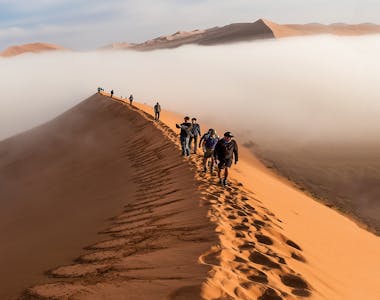
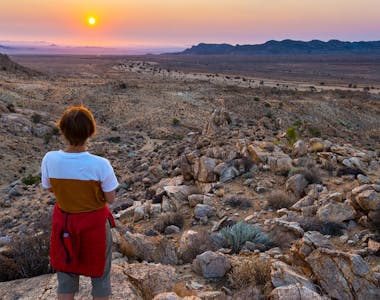
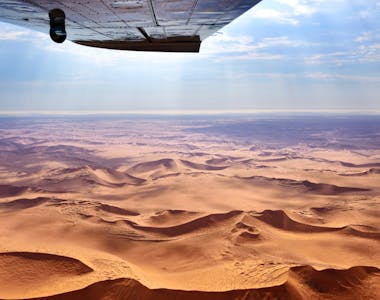
Namibia Highlights
Book With Confidence
Monthly Payments
Spread the costs with no interest or additional fees
Best Price Guarantee
We won't be beaten on price. If you find this adventure at a lower price please get in touch!
Reserve now & pay later
Reserve your adventure today and pay later, free of charge
ATOL protected
Book with confidence
Hold your space today, for free
or book your trip with a deposit and then pay the rest in instalments.
Reserve your flights with us
Add flights to your booking and we'll take care of the rest. You'll get 24/7 support from our team & ATOL protection.
Speak to our experts
Call or email our expert team to find out more and help with ideas and planning.
